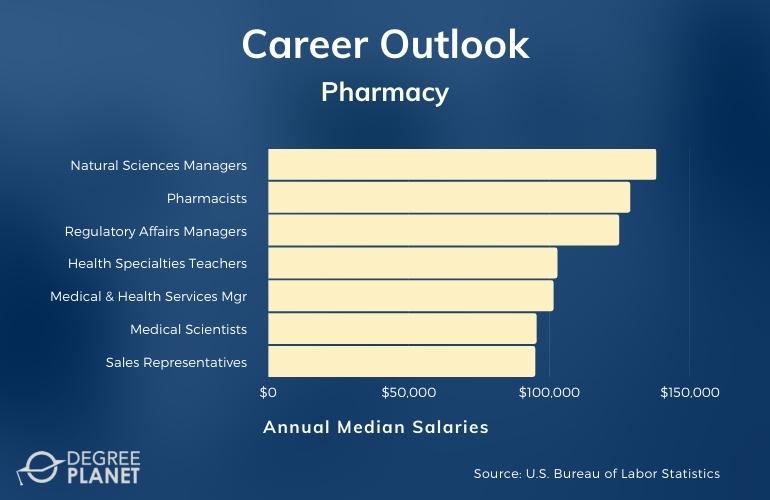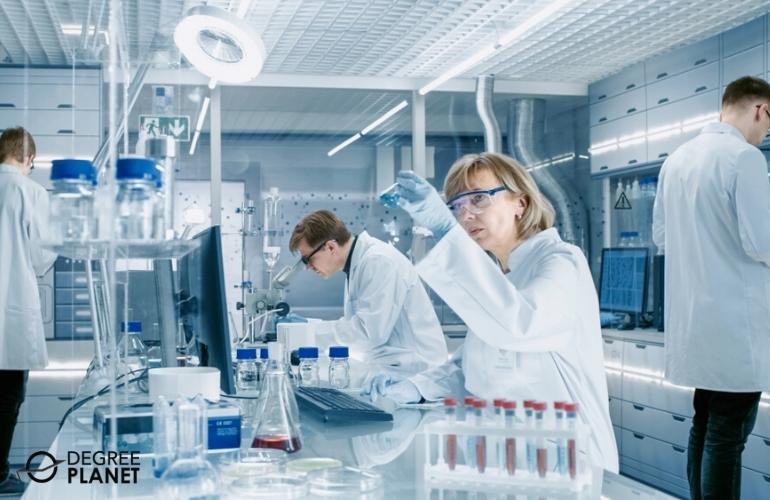If you want to become a licensed pharmacist, then it’s necessary to earn your Doctor of Pharmacy.
![Best Online Doctor of Pharmacy [PharmD] Programs](https://www.degreeplanet.com/wp-content/uploads/2022/10/best-online-doctor-of-pharmacy-programs.jpg)
This advanced degree can provide the training you need for a career as a community pharmacist or a pharmaceutical researcher. In a pharmacy doctorate program, you’ll study science, healthcare, and professional practices.
Editorial Listing ShortCode:
By the time you graduate, you may be prepared to sit for licensing exams and start your career as a pharmacist who makes a difference in others’ health and well-being.
Online Doctor of Pharmacy Programs

For many people, medication is an important part of life. Medicines are used to heal diseases, reduce pain, and improve chronic conditions.
As a pharmacist, you could play an essential role in helping people get the medication they need. To do so, it’s necessary to earn your doctorate in pharmacy, also known as a Pharm.D. Students often enter a pharmacy program with a robust science background. It’s common for students to have a bachelor’s degree in a science field, such as biology.
Editorial Listing ShortCode:
Some PharmD programs accept students with just 2 to 3 years of undergraduate work, but that requires special transfer arrangements. Before you can enter a PharmD program, you may be required to pass an entrance exam. The Pharmacy College Admission Test (PCAT) shows your readiness for doctoral studies in this field.
The accrediting body for pharmacy training programs is the Accreditation Council for Pharmacy Education (ACPE). It’s beneficial to enroll in a pharmacy training program that’s accredited by this organization.
Since a Doctor of Pharmacy provides in-depth training for aspiring pharmacists, students can learn about:
- Biochemistry
- Biostatistics
- Business management
- Drug interactions
- Healthcare system
- Immunizations
- Legal and ethical issues
- Physiology
- Professional pathways
It is also important to gain hands-on experience in this field. You will likely complete lab work and engage in practicums during your program.
After graduation, you might complete a longer internship as well, especially if you want to specialize. The full requirements may depend on the licensing rules in the state where you intend to practice. Before you can become a licensed pharmacist, it’s also necessary to pass qualifying exams that are administered by the National Association of Boards of Pharmacy (NABP).
The tests are the North American Pharmacist Licensure Examination (NAPLEX) and the Multistate Pharmacy Jurisprudence Examination (MPJE). Once you meet your state’s requirements, you can qualify to become licensed as a pharmacist. Some professionals work for a drugstore or a hospital. There are also jobs for pharmacists in drug development, pharmaceutical sales, health informatics, and education.
Pharmacy Careers & Salaries

Working as a pharmacist is the most common job for professionals with a PharmD. Many pharmacists have jobs in retail locations. Others work in hospital pharmacies or for home-delivery medication companies.
Pharmacists have other career options available to them, too. For example, you could look for work in the field of pharmacy informatics. That job involves using medical records software to improve the process of prescribing medications or fulfilling pharmacy orders.
Some people work for pharmaceutical companies. Working as a sales representative is one possible job, and being a regulatory affairs manager is another potential line of work. Research positions could also be a possibility for people with this degree.
Some might get started as lab technicians and make their way into leadership roles. Pharmacy students study a good deal of chemistry, so roles in medicinal chemistry might be available. According to the Bureau of Labor Statistics, here are some potential career paths related to the field of pharmacy.
| Careers | Annual Median Salaries |
| Natural Sciences Managers | $137,900 |
| Pharmacists | $128,570 |
| Regulatory Affairs Managers (Included in Managers, All Other) | $124,650 |
| Health Specialties Postsecondary Teachers | $102,720 |
| Medical and Health Services Managers | $101,340 |
| Medical Scientists | $95,310 |
| Wholesale and Manufacturing Sales Representatives (Technical and Scientific Products) | $94,840 |
| Chemists | $79,430 |
| Writers and Authors | $69,510 |
| Clinical Laboratory Technologists and Technicians | $57,800 |
Pharmacists have a solid skill set that is useful for traditional pharmacy jobs as well as a range of other health and science roles. Medical scientist jobs may also be relevant to a pharmacy background. In particular, pharmacists may look into becoming toxicologists.
Clinical research coordinators are a type of science manager. They may oversee clinical trials for new medications. Holding a doctorate is also a key qualification for teaching courses at the college level. Some pharmacists might be interested in becoming educators who teach pharmacy principles to college students.
Editorial Listing ShortCode:
Writing jobs might be available as well. A pharmacist’s training could be useful when writing articles on healthcare or science topics. Pharmacists may also excel at writing grant proposals for health-related projects.
Doctor of Pharmacy Curriculum & Courses

The schooling to become a doctor in pharmacy usually takes around 4 years. During that time, you might take classes similar to the following:
- Biostatistics: There may be a course that teaches you how to calculate and interpret statistical data for scientific research.
- Chemistry for Pharmacy: You’ll study the chemistry of the human body and medicines so that you have a better understanding of how pharmaceuticals work.
- Clinical Studies: This course will teach you about how drug trials are designed and equip you to study research literature.
- Essential Pharmacy Practices: The topics in this foundational class may include reading prescription orders, dosing medication, performing calculations, compounding drugs, and maintaining sterile environments.
- Law and Ethics in Pharmacy: You will study legal obligations, ethical issues, and privacy matters that affect practicing pharmacists.
- Patient Care: In this class, you’ll learn communication and health promotion strategies that you can use when working with pharmacy customers.
- Pharmacokinetics: This course will teach you how medications move through the body, including how they’re absorbed and metabolized.
- Pharmacotherapy: The emphasis in this class is on how drugs can be used to treat various ailments and diseases.
- Pharmacy Management: A business-focused class may equip you to work with team members, maintain the financial aspects of your pharmacy, and develop other important leadership skills.
- Quality Assurance: You may study ways to promote safety and reduce errors in medication development, dispensing, and use.
The last year of your program may be dedicated to a variety of practicum experiences in local pharmacy settings. There may be some required practicums as well as options for practicum electives.
Admissions Requirements

When you apply to pharmacy school, you can expect there to be a list of admissions requirements. They may include:
- Application form — perhaps through the Pharmacy College Application Service (PharmCAS)
- Contact information or letters from professional and academic references
- Interview
- Official college transcripts from all previously attended schools
- Scores from the Pharmacy College Admission Test (PCAT) — not required by all schools
Colleges may also have a list of prerequisite courses that you’re required to take at the undergrad level before entering the doctoral program. They may include organic chemistry, microbiology, and human anatomy and physiology.
Accreditation

Becoming a licensed pharmacist is a rigorous process. To meet the qualifications, it’s necessary to have a thorough education, and that means attending a regionally accredited school.
Accreditation has many benefits for students. For one, it provides assurance that you’re earning a credible degree. It may also qualify you for federal financial aid. Sometimes, regionally accredited coursework transfers between schools as well.
Editorial Listing ShortCode:
Plus, licensing boards usually require applicants to hold accredited degrees. Licensure is an essential step to getting hired as a pharmacist.
ACPE Accreditation
In addition to regional accreditation, it’s beneficial to also seek out accreditation from the Accreditation Council for Pharmacy Education (ACPE). This is a programmatic credential that’s given specifically to pharmacy programs.
Programmatic accreditation ensures that a degree program thoroughly prepares graduates for work in a particular industry. Accordingly, your state licensing board may require a degree from an ACPE accredited institution. ACPE evaluates pharmacy programs based on 25 standards. Both campus-based and online pharmacy doctoral programs can receive this accreditation.
Pharmacy Licensure and Certifications

You’re required to be licensed by your state board before you can practice as a pharmacist. If you wish to become a pharmacist, becoming licensed requires:
- Earning an accredited PharmD
- Passing exams
- Completing internship hours
While your degree program may help you gain the necessary internship experience, additional hours may be required after graduation. You can also specialize as an expert in a particular branch of pharmacy practice. The Board of Pharmacy Specialties (BPS) administers board certification. The specialty options include geriatric, oncology, and pediatric pharmacy.
Financial Aid and Scholarships

Tuition assistance programs may help you cover the costs for becoming a pharmacist. Filling out the Free Application for Federal Student Aid (FAFSA) may help you secure loans or work-study opportunities from the federal government. Your state may have loan or grant programs as well.
Some colleges give scholarships to select students. Outside scholarship programs—for example, those offered by industry organizations—can be another valuable source of financial support. You could see if there’s employer-based aid available to you as well.
What Is a PharmD Degree?

A Doctor of Pharmacy (PharmD) degree is an educational program that prepares students for careers as licensed pharmacists. It’s a professional degree at the doctoral level.
The studies usually take about 4 years and include hands-on practice experiences. The coursework may include classes in physiology, chemistry, management, and clinical research. The practicum portions of the program may be completed in local pharmacy settings.
Many people who earn this degree go on to pursue licensure. That requires passing exams and meeting all of your state board’s prerequisites. An accredited PharmD is a key step toward fulfilling the requirements.
What Can You Do with a Doctor of Pharmacy Degree?

With a PharmD, most graduates go on to become licensed pharmacists. The Bureau of Labor Statistics lists multiple work settings for pharmacists. Community pharmacists are employed in drugstores and other retail settings. Clinical pharmacists work in hospitals and healthcare facilities.
Editorial Listing ShortCode:
There are also jobs for pharmacists in insurance companies and drug manufacturing companies. Some pharmacists specialize in veterinary pharmacy for animals. Other potential jobs for PharmD graduates include being a pharmaceutical sales rep or a clinical researcher. Pharmaceutical informatics could be another line of work to pursue. Plus, since this is a doctoral degree, teaching college classes may be an option as well.
What Does a Doctor of Pharmacy Do?
Typically, a Doctor of Pharmacy works as a pharmacist. Pharmacists in a retail setting might fulfill medication orders and answer patients’ questions about their prescriptions. Pharmacists are experts in pharmaceuticals, and they work hard to ensure safe, accurate dosing for patients. At times, they may consult with other healthcare providers about the best drug combinations or dosing schedules.
A Doctor of Pharmacy may have other responsibilities as well. For example, professional pharmacists sometimes administer immunizations to the public. They can also perform managerial roles, coordinating pharmacy staff and overseeing expenses.
Are Pharmacists Doctors?

Pharmacists and medical doctors both work in healthcare, but they do very different jobs. Becoming a pharmacist requires earning a doctoral education. The official degree is called Doctor of Pharmacy (PharmD). So, yes, a pharmacist is a doctor in that regard. That’s not the same as being a medical doctor, though.
Pharmacists don’t go through med school or medical residencies. They learn to treat patients by providing medication and other pharmaceutical interventions. Unlike medical doctors, they don’t provide diagnoses or perform surgery.
How Long Does It Take to Become a Pharmacist?

Most people spend 8 years in school before becoming a pharmacist. First, it’s necessary to earn a bachelor’s degree, which generally takes 4 years of full-time study. Then, you can enroll in pharmacy school, which is usually another 4-year program.
There are ways to speed up this process, though. For instance, some doctoral programs have arrangements with certain undergrad programs. With this type of arrangement, you may be able to advance to pharmacy school after just 2 or 3 years of undergraduate study.
Also, you may be able to enroll in an accelerated doctoral program. That could allow you to finish your pharmacy studies in about 3 years.
What’s the Difference Between PharmD vs. MD Programs?
For an advanced healthcare degree, you could earn a PharmD or an MD, but each will lead to a different career path. Here’s how they compare.
| Doctor of Pharmacy (PharmD) | Doctor of Medicine (MD) |
|
|
Both MDs and pharmacists play critical roles in healthcare.
What’s the Difference Between a PharmD vs. PhD in Pharmacy?
There are two different pharmacy doctorate programs: a Doctor of Pharmacy (PharmD) and a Doctor of Philosophy (PhD) in Pharmacy. They’re distinctly different degrees, so it’s strategic to select the one that’s right for you.
| Doctor of Pharmacy | PhD in Pharmacy |
|
|
A few schools offer joint PhD/PharmD programs.
What’s the Difference Between a Pharmacologist vs. Pharmacist?
You could get involved in the pharmaceutical industry as a pharmacologist or a pharmacist. Here are some general differences about those roles.
| Pharmacists | Pharmacologists |
|
|
In either role, you might be able to specialize in an area like cardiology or nuclear pharmacy.
Is a Doctor of Pharmacy Worth It?

Yes, a Doctor of Pharmacy is worth it for many students. Earning a PharmD is a key step for aspiring pharmacists. Pharmacists play an essential role in their communities. They are an integral part of a patient’s healthcare team and contribute to people’s well-being.
Editorial Listing ShortCode:
The projected growth rate for pharmacy jobs over the next ten years is 2%, according to the Bureau of Labor Statistics. They estimate that 13,600 pharmacist jobs will open up each year, on average.
Universities Offering Online Doctor of Pharmacy Degree Programs
Methodology: The following school list is in alphabetical order. To be included, a college or university must be regionally accredited and offer degree programs online or in a hybrid format.

Butler University offers a Doctor of Pharmacy. The curriculum covers essential concepts and skills like immunology, clinical biochemistry, pharmacist assessment and immunization, therapeutics, pharmacokinetics, and pharmacy policy and law. The program requires the completion of 139 credit hours. Fully online classes are complemented by in-person clinical rotations where students can gain hands-on experience in their field.
Butler University is accredited by the Higher Learning Commission.

Creighton University offers a Doctor of Pharmacy. The curriculum seeks to develop key skills, like completing medication assessments, developing care plans, and counseling and evaluating patients. Students in the distance pathway attend didactic courses online. Laboratory and other intensives meet on campus in the summer, while in-person clinical rotations can be completed in students’ local areas.
Creighton University is accredited by the Higher Learning Commission.

D’Youville University offers a Doctor of Pharmacy. Students who are passionate about providing exceptional patient care may find an ideal next step in this program. The curriculum is delivered primarily online and is complemented by periodic on-campus intensive experiences. On average, students can complete the program’s 145 required credit hours in 3 years.
D’Youville is accredited by the Middle States Commission on Higher Education.

Duquesne University offers an online program for a Doctor of Pharmacy. Potential courses include Pharmaceutical Calculations, Human Physiology and Pathology, Pharmaceutical Law and Ethics, Public Health Epidemiology, and Therapeutic Case Studies. To graduate, students must complete 141 credit hours. Most students can complete the program’s required coursework in 4 years.
Duquesne University is accredited by the Middle States Commission on Higher Education.

Lake Erie College of Osteopathic Medicine offers a long distance program for a Doctor of Pharmacy. It aims to help students develop foundational knowledge in physiology and biochemistry before moving on to advanced pharmacological concepts and technical skills.
Students can typically complete the program’s requirements in 4 years. Many graduates pursue careers in settings like hospitals, clinics, government agencies, research facilities, pharmaceutical companies, and universities.
LECOM is accredited by the Middle States Commission on Higher Education.

Manchester University offers a distance-based program for a Doctor of Pharmacy. This program boasts flexible learning formats, excellent faculty mentoring, technological support, and counseling services. To graduate, students must complete 144 credit hours. Throughout the 4 year plan of study, students must spend about 15 weeks on-campus and complete the rest of their studies online or locally.
Manchester University is accredited by the Higher Learning Commission.

Massachusetts College of Pharmacy and Health Sciences offers a Doctor of Pharmacy. This program is intended for licensed pharmacists in the US who are pursuing additional education for career advancement. Classes meet primarily online, though some on-campus experiences are required. The program is designed with working professionals in mind and can typically be completed in 24 months of part-time study.
MCPHS is accredited by the New England Commission on Higher Education.

Shenandoah University offers a Doctor of Pharmacy. Potential courses include Applied Pharmacokinetics and Pharmacogenomics, Patient Assessment, and Drug Literature Analysis. All didactic courses meet fully online, but students must attend one on-campus clinical skills assessment and in-person clinical rotations. The program requires the completion of 53 credit hours.
Shenandoah University is accredited by the Southern Association of Colleges and Schools Commission on Colleges.

St. John Fisher University offers a Doctor of Pharmacy. The curriculum emphasizes professionalism, integrity, and diversity alongside essential clinical and drug administration skills. On average, students can complete the program’s required credit hours and 42 weeks of clinical rotation in 4 years of full-time study. There are both in-person and online learning options available to students.
St. John Fisher University is accredited by the Middle States Commission on Higher Education.

The University of Colorado—Anschutz offers a Doctor of Pharmacy. The program is designed to provide licensed pharmacists with advanced clinical pharmacy education and is open only to students holding a Bachelor of Science in Pharmacy. Most students can complete the program’s degree requirements in 2 years. All classes meet 100% online.
The University of Colorado Anschutz is accredited by the Higher Learning Commission of the North Central Association of Colleges and Schools.

Western New England University offers a Doctor of Pharmacy. The curriculum aims to help students develop the technical, social, and administrative skills required to excel in pharmacological sciences and patient care. The program can be attended in-person or using a primarily online attendance model. Students can typically finish the program’s 146 required credit hours in 4 years.
Western New England University is accredited by the New England Commission of Higher Education.
Getting Your Doctor of Pharmacy Online

Becoming a pharmacist would allow you to help people with their health. It could also pay a salary that’s well above average.
If that’s what you want to do with your life, then it’s necessary to earn a Doctor of Pharmacy degree. Known as a PharmD, this degree usually takes about 4 years to complete.
In order to maintain your work and life responsibilities during that time, you might think about getting your PharmD online. Taking online classes can lead to a respected degree from an accredited institution. You could graduate ready to make a difference in your community.

